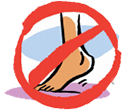DIABETIC FOOT CARE
The doctors at Commonwealth Foot and Ankle Center specialize in diabetic foot care.
If you are among one of the millions of people in the United States with diabetes, it is important to visit your podiatrist for regular foot examinations in order to maintain healthy feet.
Diabetics are more prone to various foot problems than those without diabetes due to the development of painful nerve damage called peripheral neuropathy. Neuropathy can affect your entire body, but most often the legs and feet develop more serious complications.
The damage to your nerves can cause loss of feeling in your feet, making it difficult to detect pain as easily as someone who does not have diabetes. As a result, you could sustain a cut, wound or injury and not even notice until after it becomes more serious. Sometimes a minor injury or cut can become infected and become serious very quickly if the feet are not being regularly examined.
Something as minor as a blister on your toe can turn serious and lead to an amputation if left untreated.
Below are a few tips to help ensure your feet stay healthy in-between visits with your podiatrist.

Ask your podiatrist how you should care for your toenails.
It is important for diabetics to maintain regular nail care.
Most insurances will cover nail trims for diabetics who have poor circulation or loss of sensation in their feet.
Diabetics must be careful when trimming their nails at home because it can be easy to cut yourself without noticing.

Wash your feet daily.
Wash your feet every day in warm water with mild soap.
Hot water and harsh soaps can damage your skin.
Check the water temperature with your fingers or elbow before putting your feet in.
Your diabetes may make it difficult to sense water temperature with your feet.

Dry your feet thoroughly.
Gently pat your feet to dry them and make sure to dry well.
Infections tend to develop in moist areas, so make sure you dry the area between your toes well.

Keep your skin soft.
After washing and drying, put lotion on them to prevent cracking.
But not between your toes!

Inspect your feet daily.
Look carefully at the tops and bottoms of your feet.
Have someone else do it if you can’t see them.
Check for dry, cracked skin, blisters, cuts, scratches, or other sores.
Check for redness, increased warmth, or tenderness when you touch an area.
Watch for ingrown toenails, corns, and calluses.
If you notice any of these issues, call and schedule an appointment with your podiatrist.

Wear clean, soft socks.
Wearing socks helps maintain moisture in your feet and can protect your feet from rubbing in your shoes.
Make sure you are wearing a fresh, clean pair daily.
Diabetic socks are a great option!

Keep your feet warm and dry.
Always wear well fitting shoes to protect your feet and keep them clean and dry.
Qualified diabetics may have a pair of shoes covered yearly by their insurance.

Never go barefoot.
- Going barefoot, even in your home, can put you at increased risk of stepping on something that can injure your foot.
If you have neuropathy, you may step on something and not even notice it.
It’s very important to always wear a soled shoe, even in your home.
House slippers, made specially for diabetics, are a great option!

Examine your shoes daily.
Check your shoes each time you put them on for loose debris, cracks, pebbles, nails or anything else that could hurt your feet.
Wearing clean, properly fitted shoes that are in good condition is a great step towards your overall foot health!
